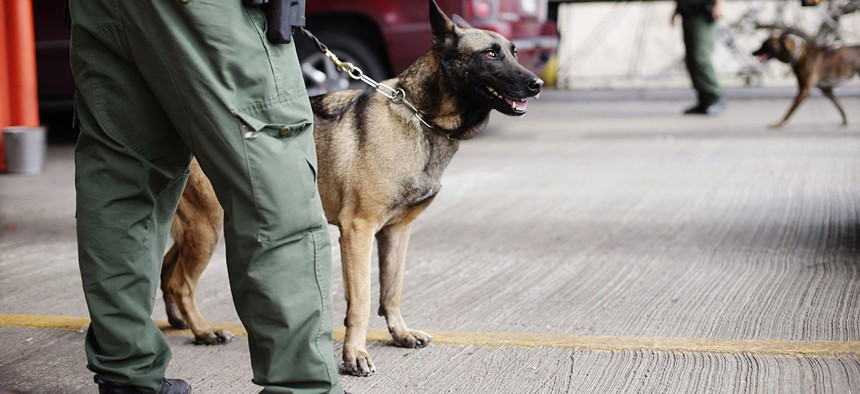Border Patrol Sniffs Out High-Tech Collars for Canine Agents

U.S. Customs and Border Patrol agents and K-9 security dogs keep watch at a checkpoint station in Falfurrias, Texas. Eric Gay/AP File Photo
Homeland Security's K-9 teams might use wearable devices to ensure the dogs aren't injured on the job.
Dogs will soon be the guinea pigs in a new Homeland Security Department pilot assessing whether wearable devices can be used to monitor K-9 units' health in real time.
DHS recently awarded $198,000 to a technology company called PetPace, which manufactures sensor-equipped collars, designed to continuously collect dogs' vital signs, including temperature, heart rate and respiration. If variations are detected, the company's health monitoring system alerts owners.
Customs and Border Protection's K-9 units, which are responsible for sniffing out illegal drugs, firearms, currency and trafficked persons at checkpoints and on the border, often work in tough conditions, according to the agency.
» Get the best federal technology news and ideas delivered right to your inbox. Sign up here.
“Due to the high-pressure operations tempo, physical demands and varied climates in which canine teams must operate, canines may suffer health problems that—if not identified and remediated quickly—may cause severe illness, injury or even death,” the original solicitation says.
This is just the first award under the K9 Wearables Solicitation. DHS' open call for technology is intended to determine if the wearable devices humans use could be adapted for canine use, according to the solicitation. Dogs create some unique challenges, the solicitation says; it might be difficult to maintain sufficient skin contact if the animal is moving, and it might not like wearing the monitors. Vest-based devices might unintentionally raise the wearer's body temperature and products may be “consumed, chewed on, or otherwise destroyed by canines when not under direct supervision.”
Sometimes, those dogs might be working away from a handler, meaning the device may need to store information until it can be uploaded to a handler's device and may need a long battery life.
The solicitation comes from DHS' Silicon Valley Innovation Program, operated out of the department's California outpost established about two years ago. The program, which uses the "Other Transactions Solicitations" to expedite the contracting process for certain projects, specifically seeks commercial companies whose products might be tweaked for federal use.
CBP has more than 1,500 canine teams. Information collected from the wearables "could translate to improved animal performance and care in the field,” CBP's Acting Commissioner Kevin McAleenan said in a statement.
The call is open until June, and covers other topic areas including recording and transmitting animals' vital signs, receiving, storing and analyzing that data, and maintaining and updating the sensors in the wearable devices.


